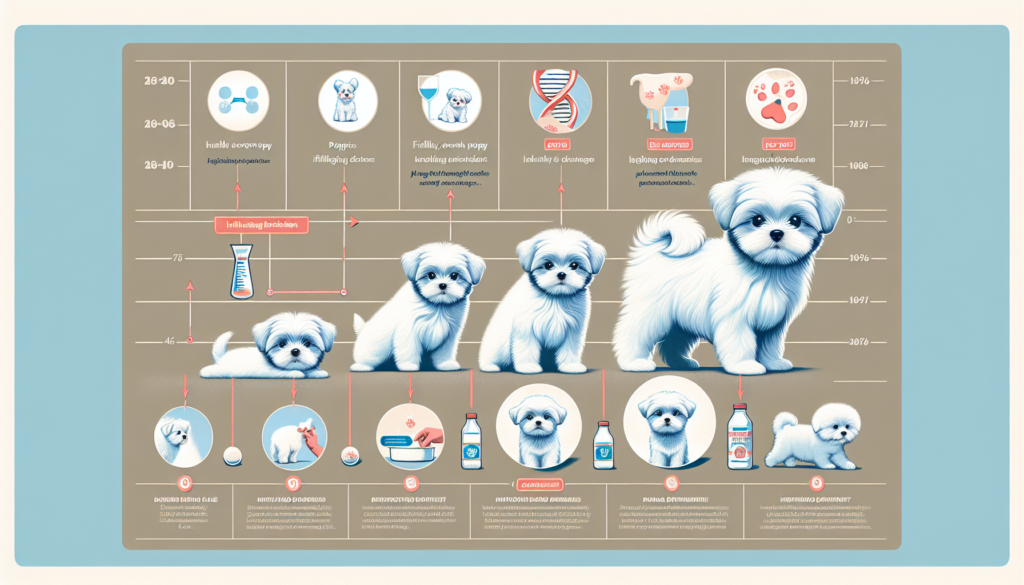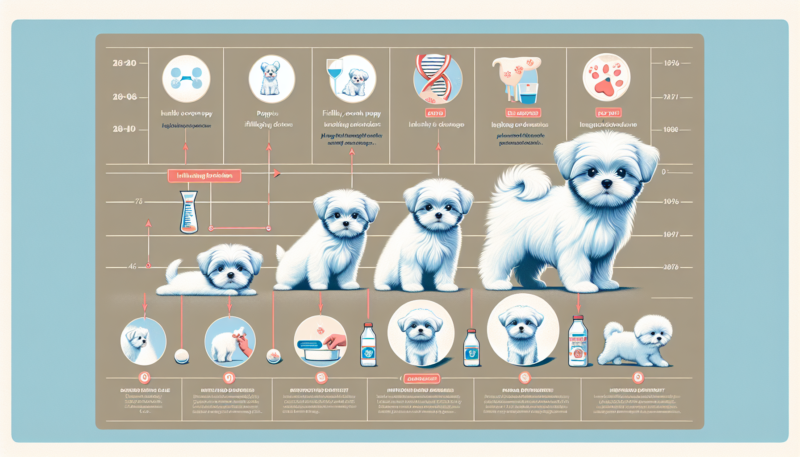If you have a Maltese dog as a furry companion or are considering getting one, one question that may be on your mind is, “When do Maltese stop growing?” Understanding the growth patterns of this adorable breed is essential for providing the best care and ensuring their healthy development. In this article, we will explore the different stages of a Maltese’s growth and provide insights into when you can expect them to reach their full size. So, let’s dive in and discover when your Maltese will reach their adult size!

Factors Affecting Growth of Maltese
When it comes to the growth of a Maltese dog, there are several factors that can influence their development. Understanding these factors can help you ensure that your Maltese is growing up healthy and strong.
Genetics
Genetics play a significant role in determining the growth of a Maltese. Just like with humans, the genes passed down from their parents can affect their size, weight, and overall physical characteristics. If both of their parents are small, it’s likely that the Maltese pup will also be petite.
Gender
Gender is another factor that can impact the growth of a Maltese. Typically, male Maltese dogs tend to be slightly larger than their female counterparts. This is something to keep in mind when monitoring and comparing the growth of your Maltese with others.
Nutrition
Proper nutrition is essential for the healthy growth of any dog, and Maltese are no exception. Feeding your Maltese a well-balanced diet that is appropriate for their age and size is crucial. Providing them with high-quality dog food that is rich in nutrients will help support their growth.
Exercise
Regular exercise is vital for the healthy development of a Maltese. Engaging them in physical activities such as walks, playtime, and interactive games will ensure that they are getting the exercise they need. However, it’s important to take their size and age into consideration to prevent overexertion or injury.
Health
The overall health of a Maltese can also impact their growth. Any underlying health conditions or illnesses can potentially affect their development. It’s crucial to maintain regular veterinary check-ups and address any health concerns promptly to ensure optimal growth.
Physical Growth Stages of Maltese
Understanding the different growth stages of a Maltese can help you track their progression and ensure they are developing as expected. Here are the key stages of a Maltese’s physical growth:
Neonatal Stage
The neonatal stage begins at birth and lasts until around two weeks of age. At this stage, the Maltese puppies are completely dependent on their mother for nourishment and care. They are tiny, fragile, and their eyes and ears are closed.
Puppy Stage
The puppy stage is from three weeks to three months of age. During this period, puppies start to explore their surroundings and develop social skills. They will begin to open their eyes and ears, and their baby teeth will start to come in.
Adolescent Stage
The adolescent stage occurs between four and six months. At this point, Maltese puppies will experience a growth spurt and their adult teeth will start to replace their milk teeth. They may become more independent and start testing their boundaries.
Adult Stage
The adult stage of a Maltese begins at around seven months and lasts until they are about one year old. Most Maltese will have reached their full height by this stage, although they may still continue to gain some weight and fill out.
Senior Stage
The senior stage begins when a Maltese reaches around the age of seven or eight. During this stage, you may notice some signs of aging, such as decreased activity or mobility. It’s important to provide extra care and regular check-ups to ensure their well-being.
Average Size of Fully Grown Maltese
When it comes to the size of a fully grown Maltese, both height and weight are crucial factors to consider.
Height
On average, a fully grown Maltese stands between 8 to 10 inches tall at the shoulder. However, it’s worth noting that individual Maltese dogs may vary slightly in height depending on their genetics and overall health.
Weight
In terms of weight, a healthy adult Maltese usually weighs between 4 to 7 pounds. Just like height, the weight of a fully grown Maltese can vary depending on factors such as genetics, gender, and overall health.
When Do Maltese Stop Growing?
The growth timeline for Maltese dogs can vary, but generally, they stop growing in height and weight around the first year to 18 months of age. Let’s delve into the specific growth timelines for height and weight.
Height Growth Timeline
Most Maltese dogs will reach their maximum height by the time they are around seven to nine months old. However, it’s important to remember that this is just an average timeline, and individual Maltese may reach their full height earlier or later.
Weight Growth Timeline
In terms of weight, Maltese dogs usually reach their adult weight by the time they are around 10 to 12 months old. Again, this is just an average timeline, and individual Maltese might reach their full weight earlier or later.

Importance of Monitoring Growth
Monitoring the growth of your Maltese is crucial for several reasons. By observing their growth, you can:
Prevent Health Issues
Monitoring your Maltese’s growth allows you to identify any potential health issues early on. If you notice any unusual growth patterns or deviations, you can seek veterinary assistance to address the problem promptly.
Determine Nutritional Needs
Tracking your Maltese’s growth helps you determine their nutritional needs. As they progress through various growth stages, their dietary requirements change, and ensuring they receive the appropriate nutrients is essential for their overall well-being.
Manage Exercise Levels
By monitoring the growth of your Maltese, you can adjust their exercise routines accordingly. Different growth stages may require varying levels of activity, and keeping a close eye on their growth can help prevent overexertion or a lack of physical stimulation.
Growth Concerns for Maltese
While Maltese dogs are generally healthy, there are some growth concerns that you should be aware of. These concerns include:
Slow Growth
Slow growth can indicate an underlying health issue or nutritional deficiency. If you notice that your Maltese is not gaining weight or growing at a normal rate, it’s best to consult with a veterinarian to determine the cause and address any potential problems.
Excessive Growth
On the other hand, excessive growth can also be a concern. Rapid growth can strain a Maltese puppy’s developing bones and joints, potentially leading to long-term issues. It’s important to ensure that your Maltese is growing at a steady and healthy pace.
Stunted Growth
Stunted growth refers to a lack of growth or a failure to reach the expected size for a Maltese. This can occur due to various factors, such as genetics, poor nutrition, or underlying health conditions. Identifying and addressing the cause of stunted growth is crucial for the well-being of your Maltese.
Abnormal Growth
Abnormal growth patterns, such as disproportionate body parts or asymmetry, may indicate a medical condition that requires attention. This can include conditions like skeletal deformities or hormonal imbalances. Regular monitoring of their growth can help detect such abnormalities early on.
Factors Affecting Growth Rate
Several factors can influence the growth rate of a Maltese. It’s important to consider these factors to ensure the healthy development of your furry friend.
Individual Differences
Just like humans, each Maltese dog is unique and may have different growth patterns. Genetics and inherent factors can play a significant role in determining their growth rate. Comparing your Maltese’s growth to others should be done with caution, as individual differences are common.
Health Conditions
Underlying health conditions can affect the growth rate of a Maltese. Any illnesses or medical conditions can impact their overall development. Regular veterinary check-ups and prompt treatment of any health issues are crucial to promoting healthy growth.
Dietary Imbalances
A well-balanced diet is essential for the healthy growth of a Maltese. Dietary imbalances, such as inadequate nutrients or excessive calorie intake, can lead to growth concerns. Providing a nutritionally complete and appropriate diet for your Maltese is vital to support their growth.
Lack of Exercise
Insufficient exercise can impact the growth rate of a Maltese. Regular physical activity helps develop strong muscles and bones. Failing to provide enough exercise may result in weaker bone density and muscle mass, affecting their growth and overall physical health.
Environmental Factors
The environment in which a Maltese spends their time can also affect their growth rate. Factors such as temperature, natural lighting, and exposure to pollutants can potentially impact their growth. Creating a safe and nurturing environment for your Maltese is important for their development.
Tips for Healthy Growth of Maltese
To promote healthy growth, here are some essential tips to keep in mind:
Regular Vet Check-ups
Schedule regular check-ups with your veterinarian to monitor your Maltese’s growth and address any concerns promptly. Your vet can provide guidance on their development and offer advice specific to your individual Maltese.
Balanced Diet
Feed your Maltese a balanced and nutritionally complete diet that is appropriate for their age and size. High-quality dog food and the right portion sizes are essential to meet their nutritional needs at each growth stage.
Appropriate Exercise
Engage your Maltese in regular exercise that is suitable for their age and physical capabilities. This can include daily walks, interactive playtime, and mentally stimulating activities. Adjust the level of exercise based on their growth stage to ensure it is neither excessive nor inadequate.
Good Dental Care
Oral hygiene is crucial for the overall health of your Maltese. Regularly brush their teeth and provide appropriate dental treats or toys to promote dental health. Poor dental care can impact their ability to eat and may result in nutritional deficiencies affecting their growth.
Proper Grooming
Regular grooming helps maintain the health and appearance of your Maltese’s coat. Brushing their hair, trimming their nails, and cleaning their ears are essential grooming tasks. Keeping their coat clean and free of mats also contributes to their overall well-being.
When to Seek Veterinary Assistance
While monitoring your Maltese’s growth is important, there are certain situations when it’s crucial to seek veterinary assistance:
Delay in Growth Milestones
If your Maltese is not reaching the expected growth milestones or is significantly behind compared to others of the same age, it’s essential to consult with your veterinarian. Delayed growth can be a sign of an underlying issue that needs to be addressed.
Severe Weight Fluctuations
Significant weight fluctuations, either weight loss or rapid weight gain, should be evaluated by a veterinarian. Sudden changes in weight can indicate a health problem that needs to be diagnosed and treated.
Unusual Physical Appearance
If your Maltese has any unusual physical appearance, such as asymmetry or disproportionate body parts, it’s important to have them assessed by a veterinarian. These abnormalities may be indicative of an underlying medical condition that requires attention.
Conclusion
The growth of a Maltese is influenced by various factors such as genetics, gender, nutrition, exercise, and health. Understanding the growth stages and typical size of a fully grown Maltese can help ensure that they are developing as expected. Monitoring their growth is essential for preventing health issues, determining nutritional needs, and managing exercise levels. If you have any concerns about your Maltese’s growth, it’s always best to consult with a veterinarian for professional advice and guidance. By providing your Maltese with proper care and attention, you can promote healthy growth and ensure their well-being throughout their life.
